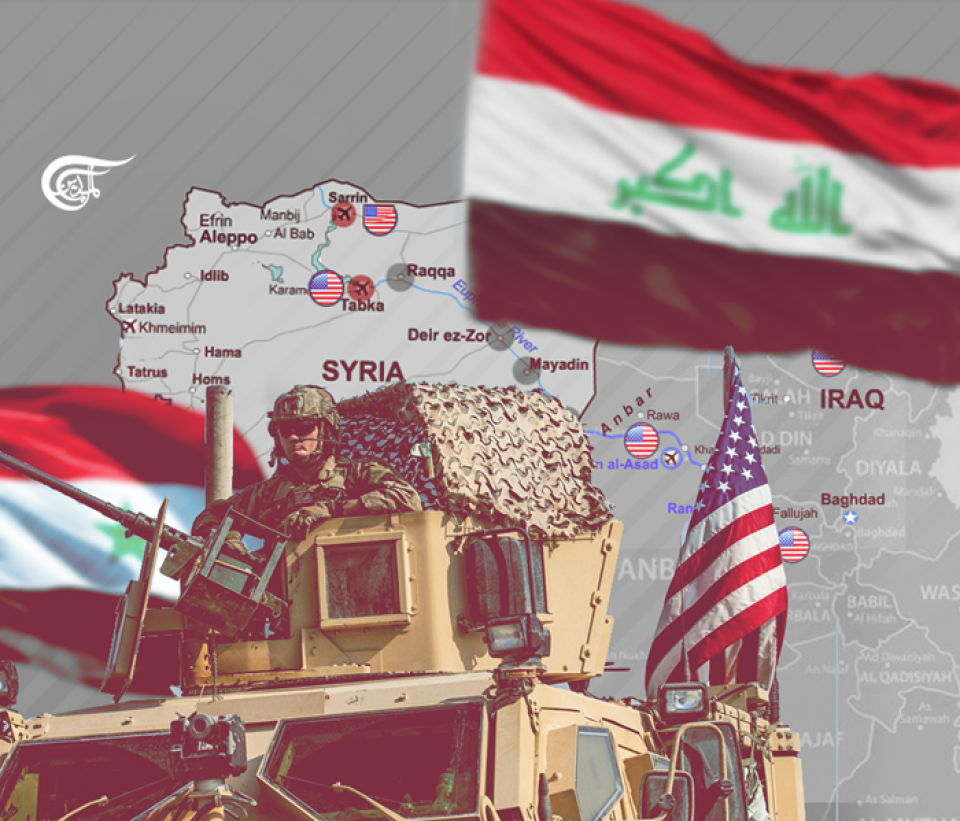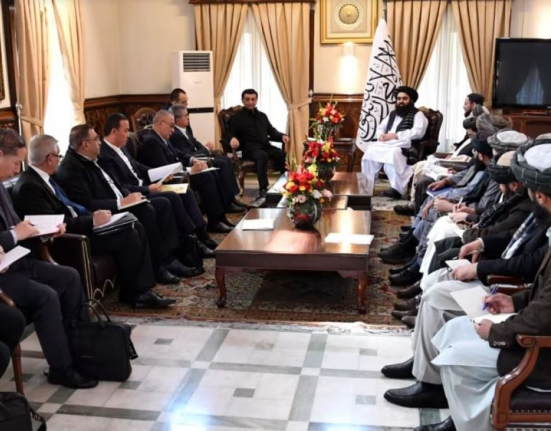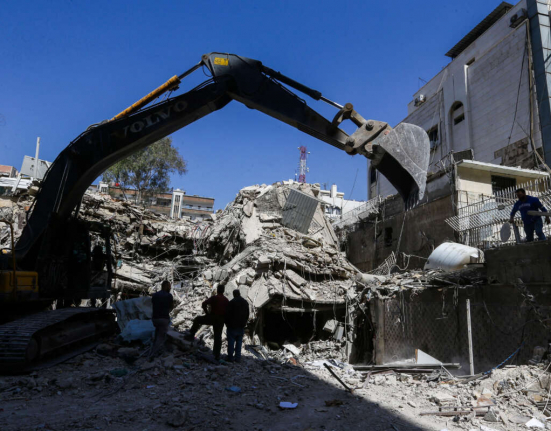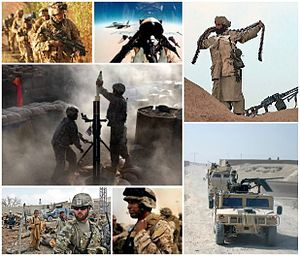by : Elijah J. Magnier , Al Mayadeen
US President Joe Biden has said his forces will stay in Iraq under a different title and will no longer be identified as “combat forces”, rather as “trainers and advisors”. No plan is offered for a reduction in the number of troops. This means that the US forces are not leaving Mesopotamia. There is no specific timetable for these forces to leave the country, unlike what the Iraqi Foreign Minister Fuad Hussein announced he had agreed with the US administration. The wish to remove all foreign troops seems beyond the Iraqi central government’s control. Thus, the Iraqi resistance will have no other option but to take over, and convince the US to leave the country, similar to what Hezbollah did to the Israeli occupation forces in Lebanon and the Taliban in Afghanistan.
In Afghanistan, the US administration ordered the withdrawal of US forces, allowing the Taliban to advance to the former bastion of Kandahar and threaten the capital Kabul. After two decades of US engagement in the war, Taliban controls half of the country, 90% of the borders with Pakistan and President Biden has apparently understood that keeping troops any longer provides “no reasonable expectation of achieving a different outcome”.
This intelligent conclusion seems applicable only in Afghanistan and not in Iraq or Syria. Indeed, an unspecified number of US forces is expected to remain in the northeastern Syrian provinces to prevent the food and energy supplies from reaching the most liberated regions that suffer heavy US-EU sanctions. Biden seems far from committed to ending America’s “forever wars.”
Hence, the total departure of the US forces from West Asia seems thus far to be a fairy tale objective. Rather than withdrawing, the US is widening its goals and even seeking to oversee the forthcoming Parliamentary elections due in October this year 2021. This means the US has self-proposed that its observers look after its own interests in Iraq and make sure that what is supposed to be a democratic election is under control, and under its control.
This new and sudden discovery of the US involvement in the Iraqi elections overlaps with the recent comments of the (former) British Ambassador in Baghdad, Stephen Hickey, weeks before his departure. The UK diplomat said that in Iraq “it will not be possible to hold fair and transparent elections.” The United Kingdom is the strongest US ally and a partner in the 2003 occupation of Mesopotamia. Therefore, it is not a coincidence to see the importance the US bestows on the next parliamentary elections overtly expressed through, its will to be overseeing their supervision, along with the United Nations observers.
Noticing the Iraqi candidates already registered for October’s elections, it is not difficult for any observer to realise that the same (current) political parties will be heavily represented in the Parliament. These may lose or gain a few seats but not enough for pro-US or anti-Iran MPs to take the leadership and choose the new Prime Minister. Also, the US needs more time if it is to change the course of the elections. Therefore, postponing the Parliamentary elections to the following spring is not to be excluded. The hope – in the US mind - is to make a difference and specifically to reduce the influence of existing political leaders.
A new pro-US Parliament could help change the January 2020 binding decision to remove the US forces from Iraq: It could legitimise their presence and even hunt down the Iraqi resistance. What the Iraqis themselves are unaware of, is having a resistance whose objectives contradict the ones of central government in Baghdad- to the advantage of the country. In this situation, all acts committed by the resistance can be denied, and Iraq could have been spared the US repercussions or sanctions when US forces are under attack and suffer casualties.
The Iraqi resistance has vowed to attack US forces because President Biden did not say he had the intention to pull out his troops from Iraq. He specifically said that he is ending all “combat missions” by the end of this year. This means:
- that the US would till then continue its combat operations in Iraq (killing Iraqis).
- that the presence of combat troops is a clear violation of the 2014 agreement when the US forces joined the Iraqi government forces to combat the “Islamic State”, ISIS.
Former Prime Minister Adel Abdel Mahdi had issued a clear order to all US forces to stop all flying missions over Iraq, including drones, without the prior permission of the office of the Commander-in-Chief of the armed forces, the PM, in person. The US ignored these Iraqi instructions, killed several Iraqi security forces, and bombed a civilian airport in Karbala. Following similar repetitive aggressions, the US assassinated the Iranian Revolutionary Guard Corps-Quds Force commander Qassem Soleimani and the Iraqi vice commander al-Hashd al-Shaabi Abu Mahdi al-Muhandes. The Prime Minister was not informed of the presence of the US drones in the Iraqi airspace, tasked with target-killing an Iranian official envoy with one of his Iraqi commanders.
Moreover, since President Biden took office in January 2021, he has ordered two separate attacks on the Iraqi security forces which are under the command of Mustafa al-Kadhemi, the Prime Minister- who was not informed before the attack. This means the US revealed that its forces, which have never been allowed to carry out the killing of Iraqi security forces, are in fact rebuffing the Iraqi leadership. Legally, and according to Iraqi law, the US should not have any “combat forces” whatsoever. But how could it withdraw forces that should not be officially existing? Also, these same US troops are expected to change the name of their mission, which actually means the same forces will continue operating for years to come. That is precisely what the Iraqi resistance said it has no intention of allowing.
And lastly, in Iraq, US and Iraqi officials said they needed US troops to fight against ISIS. That either means involving ‘combat forces” or that ISIS is still strong. Nevertheless, both Iraqi and US officials have specifically said ISIS was defeated in Iraq and Syria. Moreover, the US said it had trained tens of thousands of Iraqi troops in all combat warfare. It is unclear what is the benefit of this US training to such a large number of Iraqi forces if these are incapable of fighting the remnants of ISIS alone. Either the training is of no benefit - in this case, there is no need for US trainers- or it has given the desired results, and the Iraqis can manage to defeat the small ISIS groups on their own. The bottom line indicates that the US is using any excuse to stay in Iraq.
As for Syria, former US President Donald Trump said he is keeping his troops “to keep the oil” because ISIS was “100% defeated”. President Biden is saying he is keeping an unknown number of troops to “support the Syrian Democratic Forces (led by the Syrian Kurds) to fight ISIS”. Moreover, US forces occupying north-east Syria and the Iraqi-Syrian crossing at al-Tanf still prevent the Syrian army and its allies from crossing the Euphrates to destroy the remains of the terrorist group or follow ISIS in al-Badiya. This can only mean the US administration feels it needs a more moral reason to justify holding onto an “essential” part of Syria and stay in the Middle East.
The headings “partnership”, “intelligence cooperation”, “training”, or “fighting terrorism” mean that the US administration needs no reason to leave West Asia unless it is forced to do so, and that can only be achieved by local resistance. Biden has chosen to stay in a hostile area where US policy has failed to win “hearts and minds” in the last two decades. It should not be a surprise that the following years will not bring a change in US status towards the inhabitants of the Middle East leaving Washington far from the achievement of any of its objectives.

















